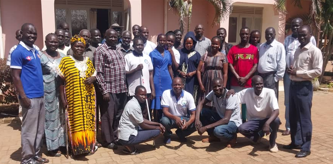The South Sudan Law Society has urged the Eastern Equatoria State Ministry of Housing, Lands, and Public Utilities to ensure transparency in land allocations and registration.
The call was made during a one-day round table discussion organized by the South Sudan Law Society to deliberate on issues of land demarcation and registration. The law society also said all public land must be recovered to be used for developmental and recreational activities.
Several residential areas in Torit Town have been demarcated with clear maps indicating open spaces; however, officials say these public spaces have been sold, and others are occupied by powerful people.
The dialogue brought together community leaders, civil society, parliamentarians, and officials from the State Ministry of Lands, Housing, and Public Utilities.
Issues raised included demarcation and registration of land, allotment of the same plot of land to different individuals, occupation of public spaces, high land registration fees, and lack of transparency in land demarcation and registration.
Counsel Jada Andrew Othawa, a legal aid officer at the South Sudan Law Society in Torit, urged the government to allocate land according to the law and embrace transparency on surveyed land.
“We have questions on misappropriation, and we are recommending that things should be done in accordance with the law. There is a need to enhance transparency in demarcation and registration through public participation, public disclosure, and clear communication channels,” he said. “There is a need to recover all public lands and open spaces that were allotted to individuals, and these should be recovered by the government. There is also a need to provide services in all areas that have been surveyed.”
For his part, Dalmas Oteher, a director at the State Ministry of Housing, Lands and Public Utilities, admitted that there is corruption in land demarcation and registration. He accused some staff in his department of being behind the mess but vowed to address land fraud in the state.
“There is corruption in this issue, especially the ledger book or the control book we have. Multiple allotments came from where? If there is a ledger book, it must start from 1 to 1000 plots,” he said. “There were concerns about why many surveyed lands are not being shown, and these are some of the challenges we are having in the ministry. Many places are not shown, and the best example is Ipalak, which was surveyed but not shown.”
Meanwhile, Muras Alphonse Chacha, the chairperson of the specialized committee for physical infrastructure in the state assembly, said land fraud in the ministry must be investigated, and those found guilty should be held accountable. He accused ledger bookkeepers of embezzlement and creating tensions among citizens during land allotment and registration.
“The blame goes to housing; the directors should take responsibility for checking on the people who are surveying and what they are doing. There should be only one ledger book per place so that if there is any checking or following up, the book will show who owns what land,” he said. “We will be checking on the physical infrastructure department. I thank Counsel Jada for this program that he brought us, which is educational.”




